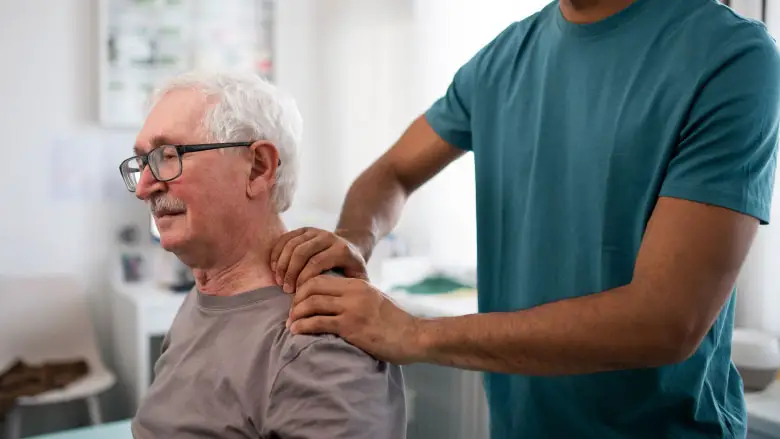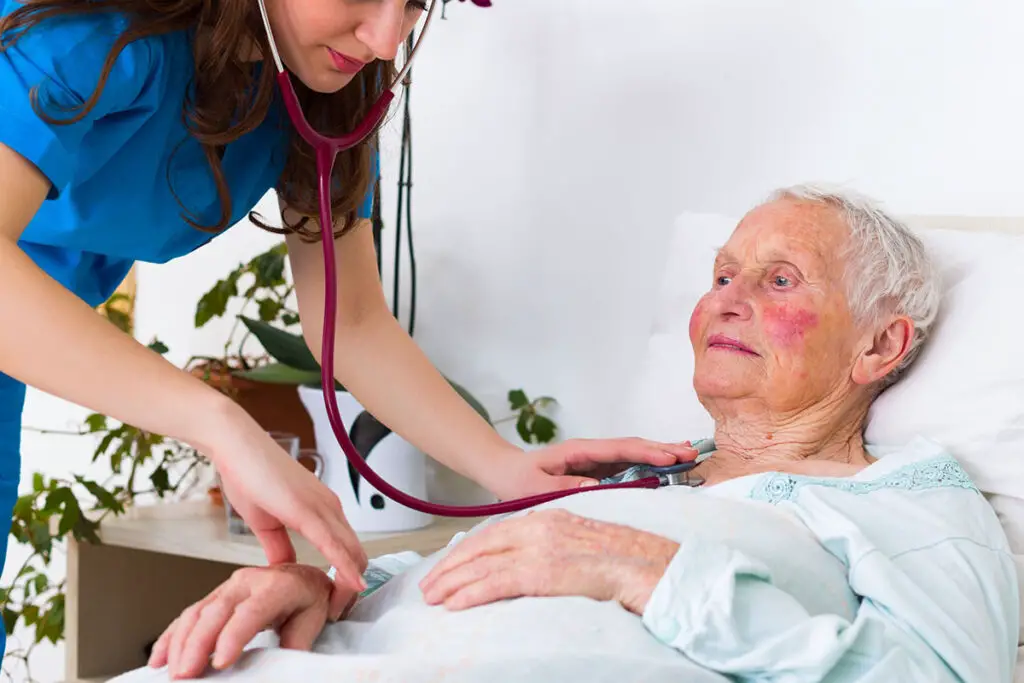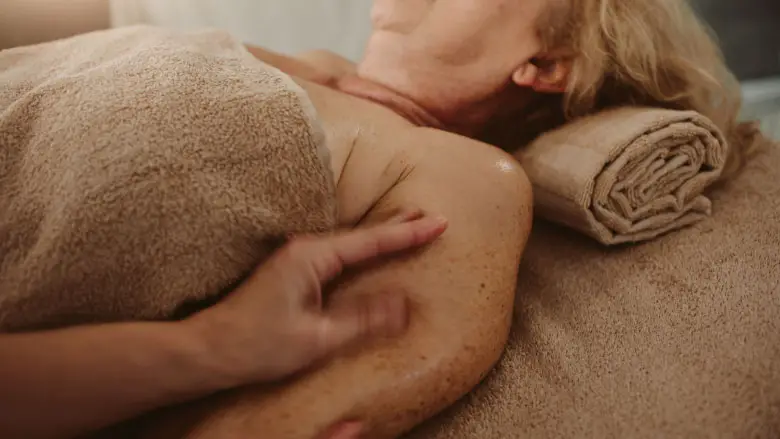Geriatric massage is not something many massage therapists specialize in. However, the medical benefits of receiving a massage at any age are enough to suggest massage therapists should learn the unique approach to massaging older adults.
What Is Geriatric Massage?
Geriatric massage is an umbrella term to describe massage of any type that is performed on an older adult. It can be performed on a specific body part or the body as a whole. The massage is often done on the elderly to provide them with refreshed muscles and skin, and it can help speed up recovery after injury or surgery.
A geriatric massage is beneficial to anyone who wants to improve their health and vigor. It is one of the least invasive health and wellness treatments there is. It typically lasts for 30-60 minutes, so it is always easy to fit it into one’s day. If you have issues with mobility, or even leaving your home is a challenge, there are home services that can provide you with this type of massage.
Benefits of Geriatric Massage
All seniors can generally benefit from a massage. Geriatric massage has many benefits. It is easy, mild, does not last long, and requires no preparation of any kind, except maybe a fresh shower. Needless to say, many people enjoy this massage and many more will, as the US population of those over 65 years old is about to hit 20% of the total population.
Massage therapists would be wise to educate themselves on the specific considerations involved with geriatric massage. Massage for the Hospital Patient and Medically Frail Client by Gayle MacDonald is one book that can help.
- Used Book in Good Condition
- MacDonald, Gayle (Author)
You may want to have a geriatric massage for both its physical and psychological benefits. This type of massage is perfect for anyone who:
- Is older than 60-65,
- Has issues with sore muscles,
- Does not move enough,
- Does not have a rich social life,
- Has issues with stiff joints,
- Has suffered injuries in youth,
- Has had surgery and the recovery is taking longer than expected,
- Has issues with skin sensitivity, a history of burns (leaving stiff, dry skin),
- Has issues with thermal regulation, etc.
There are many benefits as well. As long as it is done by a professional, in a careful, gentle manner with no risk of injury, a geriatric massage can offer the following benefits:
- Benefits to the quality of your sleep,
- The benefit of improving your anxiety,
- Improving lymphatic flow,
- Improving local circulation,
- Improving recovery after injuries and shortening healing time, and
- Speeding up the recovery after surgeries.
Better Sleep
A geriatric massage can provide you with better sleep. Relaxing the body and the mind, it will set the right tone for improved sleep. It will also improve your circulation, making you feel warmer and less stressed. A massage like this is known to have beneficial effects on sleep for days to come.
Reduced Anxiety
If you suffer from anxiety, you may also want to go for a massage like this. The thing is that the relaxation, improved circulation, and lymph drainage will all make you feel more relaxed and less stressed. You will also be experiencing friendly and gentle human touch, which is something that is known to decrease your anxiety levels.
Improved Lymphatic Flow and Drainage
A massage can improve our lymphatic flow and drainage. It does so by applying gentle pressure to the tissues, which can help stretch and contract lymph canals, opening them up. A massage like this is very helpful to all those who have lymph drainage problems, pain in their lower joints, or legs and ankles that can get swollen after standing for prolonged periods.
Improved Circulation
Similarly to what it does to increase your lymphatic flow, a geriatric massage can also improve your circulation. By applying gentle pressure to the blood vessels, it makes them more elastic and less vulnerable to injury. Be careful, though, as super-sensitive blood vessels should not be massaged – you can even end up with bruises. However, a gentle massage by a professional will offer many benefits and will be able to address issues such as stiff blood vessels prone to cracking.
Faster Recovery After Injuries
If you’ve suffered an injury, a mild massage to the area can speed up the recovery. The thing is that, as the body heals, deposits of lymph may appear in the injured spot. When this happens, you can expect swelling, pain, and prolonged healing periods. To avoid this, a massage once cleared by a doctor should help reduce the recovery period. It does so by promoting lymph drainage, ridding you of swelling. It also improves circulation, bringing all the white blood cells to the injury where they can help mend it.
Faster Recovery After Surgery
Likewise, if you’ve had surgery, you should visit a massage center to improve your healing and recovery after the medical procedure. To do this, you should first finish the initial stage of healing and be cleared by your surgeon to be able to get the massage. The reduced recovery time is a direct consequence of improved circulation.
Things to Look Out For
Considering your age and health status, a senior may want to be careful with a geriatric massage. The rule of thumb is to always go to a practitioner or a clinic you can trust. The second rule of thumb is to communicate your health-related issues very clearly.
This is an important step as it can increase your safety and improve the benefits you can get from this type of massage. In some cases, it can even be important to state which medicine you may be taking. Medicine containing anticoagulants, or some other form of blood-thinning agents, as well as medicine with blood-clotting properties may be important to the state.
Before visiting your masseuse, you should consider the following:
- Your current health status – how are you feeling and what do you want to achieve with the massage.
- Your medical condition(s) – as some conditions may not allow for all types of massages to be performed on you. This includes both physical and mental conditions.
- Any skin conditions you may have – if your skin is fragile, super sensitive, prone to injury, bruising, or tearing, make sure to communicate it.
- Your pain tolerance – you may be more sensitive to pain than other people, or even less. In the latter case, you risk injury, so speak with your massage provider about this state.
- Thermal regulation – if you easily get hot or cold, you should be given an extra light or extra thick covering.
- Any medications you may be taking (see above).
Your Current Health
Your current state of health is the first thing you should communicate. You should know how you FEEL about the massage – are you shy or embarrassed, or are there any body parts you may be sensitive about? How about your health in the past few days or weeks? How is your asthma? Think and consider all of these and report them to whoever is giving you a massage.
Your Medical Condition(s)
Your medical conditions are also very important before you head on for a geriatric massage. Asthma, high blood pressure, blood sugar, kidney issues, blood vessel issues, injuries to the next, the hips, the lower spine, or any other joint, and all other medical conditions are a must for you to clearly state to the masseuse. Allergies are also on the list, since many ointments, oils, and lubricants used during the massage may contain chemicals you may be oversensitive to.
Skin Condition(s)
Skin conditions, such as rashes, infections, wounds, and scars are also something that you should mention before your first massage. Any other conditions or tendencies (bruising, irritation, skin damage) are something to be aware of. This is something that you should always talk about, for both safety and health concerns.
Pain Tolerance
Pain threshold is very different in different people. While some may have a low threshold and be overly reactant to pain, some other people may have a very high pain threshold. The thing with pain is that it signals when something is wrong with the body, so having a pain threshold in any of the two extremes may not be ideal.
If your pain threshold is too high, unintended injuries may happen. Do not forget that, as you age, your bones calcify and become more prone to traumas. This is something to be aware of. Never forget to actively participate in your message, and always say if you feel pressure or any other sensation.
Thermal Regulation
Thermal regulation issues, such as excessive sweating or too little of it can pose problems in some cases. Too much sweat can dilute the oils and lubricants used and may cause damage to the skin. Too little sweat can leave the skin too dry, so if you feel a burning or stretching sensation, always say it to the masseuse.
Medication You May Be Taking
Some medication may be important for the masseuse as well. Any ointments, topical agents, as well as blood-clotting and blood-thinning medication, should be mentioned. Never forget to consider this before going to a masseuse. You can even consult your family doctor for their opinion on you getting a massage.
What to Look for in a Massage Therapist
When looking for a massage therapist, it is best that you try a few of them. The thing is that even the best therapist may not work for you, while others can. What you are looking for is someone with at least basic knowledge of medicine, as well as someone trained in geriatric massage. Once you’ve found the perfect fit, make sure you stay with the therapist for a long time, as they will be able to learn about you and from you and provide a better massage every single time you visit.
Geriatric Massage FAQs
How Long is a Geriatric Massage Session?
A geriatric massage session usually lasts up to 30 minutes. During this time, you will be able to get a proper massage on a single body part or a relaxing massage of the whole body. If you feel like you need a longer session, make sure to spread the message out to different body parts to avoid sore muscles the next day.
How Do You Give an Elderly Massage?
When an elderly person receives a massage, they should be aware that there are some limits to the pressure that can safely be applied to their bodies. A massage for the elderly (also known as a geriatric massage), should focus only on the surface level and the muscles found there. Any deep-tissue massage may end up in injury.
Is Massage Safe for the Elderly?
Yes, massage is safe for the elderly. If you are receiving a massage like this, you should look for a person who is experienced in this type of massage. Getting massaged by someone who does not know what they are doing may result in skin irritation and injuries.
What Is the Biggest Issue for Elderly Clients Receiving Massage?
Your health condition could be the biggest issue for an elderly client receiving a massage. It should be noted that clear communication between the therapist and the client is expected and that experience plays an important role in massaging the elderly.
Conclusion
Geriatric massage is a great addition to your life once you hit a certain age. This massage can help alleviate several health issues, including anxiety, stress, and issues with sleep and it may help to address other issues such as poor circulation and lymph flow. Always come to the massage ready, and spend time choosing the perfect massage therapist for you.





